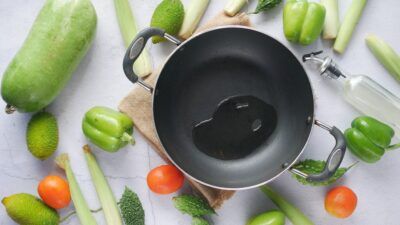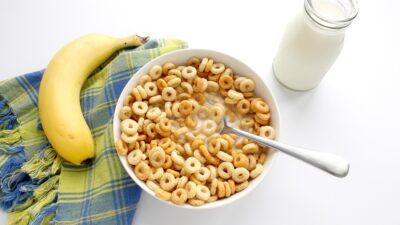5 ways to reduce stroke risk with a vegan diet

Cardiovascular disease is caused by the buildup of fatty deposits in our arteries, known as atherosclerosis. This can block the flow of oxygen-rich blood to both the heart and brain (as well as other organs), leading to a heart attack or stroke, respectively.
Following a plant-based diet can be a great way to reduce your risk of cardiovascular disease. A 2019 study concluded that plant-based diets are associated with a lower risk of cardiovascular disease, death from cardiovascular disease and death from all causes. Results from an EPIC-Oxford study published the same year also found that vegetarians and vegans had a lower risk of heart disease than meat-eaters. However, this study, and a later one published in 2022, found that vegetarians and vegans had a higher risk of stroke than meat-eaters. It is unlikely that a vegan diet inherently increases the chances of stroke, and more likely that the cohort in question was not following a healthy vegan diet. With that in mind, here are five ways we can use a plant-based diet to lower our risk of stroke.
1. Eat more fibre
A 2017 meta-analysis concluded that “individuals consuming the highest amounts of dietary fibre intake can significantly reduce their incidence and mortality from cardiovascular disease.” Government guidelines recommend 30 grams of fibre a day for adults as part of a healthy balanced diet. Other research suggests that we should consume more than 25 grams a day of soluble fibre (found in the flesh of fruit, vegetables and pulses such as peas, beans and lentils) and over 47 grams a day of insoluble fibre (found in the outer shell of seeds, grains, fruits and vegetables). In the study that showed an increased risk of stroke, the vegetarians and vegans were falling short of this number (even though the vegans still consumed more fibre than the other groups). This suggests upping our fibre intake may be one way we can protect against stroke.
2. Pump up the potassium
According to Viva!’s honorary scientific adviser, Dr Michael Greger, physician, New York Times bestselling author and internationally recognised speaker on nutrition, food safety and public health issues, “the UK vegetarians at higher stroke risk were eating so few greens and beans that they couldn’t even match the meat eaters.” This is important because fruits and vegetables are rich in potassium, and potassium-rich diets have been associated with a lower risk of stroke.
Adults need between 3,500–4,700 milligrams a day. The best plant sources of potassium include pulses (kidney beans, soya beans, adzuki beans, lentils, tempeh – fermented soya beans and edamame), potatoes (old, new and sweet potatoes), dried fruit (apricots and figs), squash (acorn and butternut), avocado, spinach, broccoli and bananas.
3. Reduce salt consumption
According to a 2018 meta-analysis, “the vast majority of the available evidence indicates that elevated salt intake is associated with higher stroke risk.” Unfortunately, most people in the UK eat far more salt than the body needs. It’s important to note that the vegetarians in the 2019 EPIC-Oxford study were eating considerably more cheese (high in salt and saturated fat) than the meat-eaters, pescatarians, and, obviously, vegans so this may have affected stroke risk for the group. Vegetarians were consuming nearly 28 grams of cheese a day, whereas the vegans would have been consuming none.
Although a wholefood plant-based diet is naturally low in salt, if you are regularly eating ultra-processed foods, such as vegan burgers, pizzas, crisps and biscuits, you may be consuming more salt than you realise. Adults should eat no more than six grams of salt (2.4 grams of sodium) per day, which is around one teaspoon. If the label only lists sodium, you can work out the amount of salt in it by multiplying the total sodium by 2.5. For example, one gram of sodium per 100 grams is 2.5 grams of salt per 100 grams.
4. Cut back on sugary food and drinks
The EPIC-Oxford studies also found that the vegetarians and vegans were drinking more fizzy drinks than the meat-eaters and pescatarians. As Dr Michael Greger points out, this might not have been a causal factor for strokes but “it might just give us an idea of how healthfully they were eating.”
Furthermore, a 2020 study, investigating the relationship between added sugar and cardiovascular disease, found that consuming more than eight servings of sugar-sweetened drinks a week was associated with an increased risk of stroke. However, the study also found that the group consuming the lowest amount of sweet treats (two or fewer a week) had the highest risk of stroke, so there may be other factors at play. The study did conclude that sugar intakes exceeding 20 per cent above our body’s energy needs, “were associated with increased risks of incident stroke and coronary events.”
5. Supplement with B12
A 2022 analysis of the findings from the EPIC-Oxford study, suggests that one reason for an increased risk of stroke amongst vegetarians and vegans may be related to insufficient B12 levels. Half of the vegans in the study were found to be deficient in this vital vitamin and the authors suggest that this could be a “possible explanation of the higher risk of stroke in vegetarians and vegans […] due to low vitamin B12 leading to raised homocysteine and increased stroke risk.”
Supplementing with B12 is cheap and easy so if you’re not already doing it, get to your local health store, or visit the Viva! shop, immediately and pick up a bottle! Viva! recommends taking a daily vitamin B12 supplement providing at least 50 micrograms per day, or weekly supplements once or twice a week that add up to 2,000 micrograms.
Find out more about B12 here!
There are many different ways to follow a vegan diet these days and not all of them are healthy. A bit of junk food every now and then probably won’t do you any harm but if you want to reap the many health benefits of a plant-based diet, it’s important to centre your diet around minimally or unprocessed wholefoods. It’s important to remember that, although stroke risk was higher for vegetarians and vegans in the EPIC-Oxford study, the risk of many other diseases was significantly lower, including: heart disease, diabetes, diverticular disease, kidney stones, cataracts and possibly some cancers. And with a few tweaks to optimise the diet, we might also be able to add stroke risk to that list.







